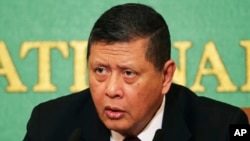The U.N. special rapporteur on the situation of human rights in North Korea said Wednesday that government is sending tens of thousands of its citizens abroad to work under harsh conditions and is making more than $1 billion a year from their confiscated salaries.
In his latest report to the U.N. General Assembly to be formally presented on Thursday, Special Rapporteur Marzuki Darusman says as many as 50,000 workers are laboring under conditions that “amount to forced labor”. The vast majority are working in China and Russia, but others are in Africa, the Middle East and Asia.
“I think it reflects the really tight financial and economic situation in the North,” Darusman told reporters.
North Korea has been under targeted international sanctions since 2006 for its launch of ballistic missiles and nuclear weapons tests.
The special rapporteur said North Koreans are mainly employed in the construction, mining, logging and textile sectors and it is believed the government is earning between $1.2 billion and $2.3 billion a year from this system.
In his report, Darusman says laborers often work up to 20 hours each day in unhealthy and unsafe environments with inadequate food rations and rarely a day off. They are threatened with repatriation if they do not perform well or violate rules. Workers are under constant surveillance by North Korean security personnel.
He called on the government to end this abuse and urged foreign companies to be vigilant so they do not become complicit in the forced labor practices.
Darusman also highlights other human rights violations in his report. He says North Korean women, men and children continue to be victims of “long-standing and on-going systematic, widespread and gross human rights violations by the government,” including torture, arbitrary detainment, summary execution and discrimination.
Last year, the Commission of Inquiry (COI), a U.N. panel tasked with probing North Korean human rights, released a lengthy report alleging gross abuses. These included summary executions, rape, torture, forced abortions and enslavement. The chief targets were religious minorities and political dissidents allegedly detained in prison camps with up to 120,000 inmates.
Darusman and the COI have both urged the U.N. Security Council to refer North Korea to the International Criminal Court to face accountability. That is unlikely to happen, however, as China – Pyongyang’s ally – holds a veto on the council and could block any referral.
Special rapporteurs are independent experts appointed by the U.N.’s Human Rights Council to report on specific human rights issues.




